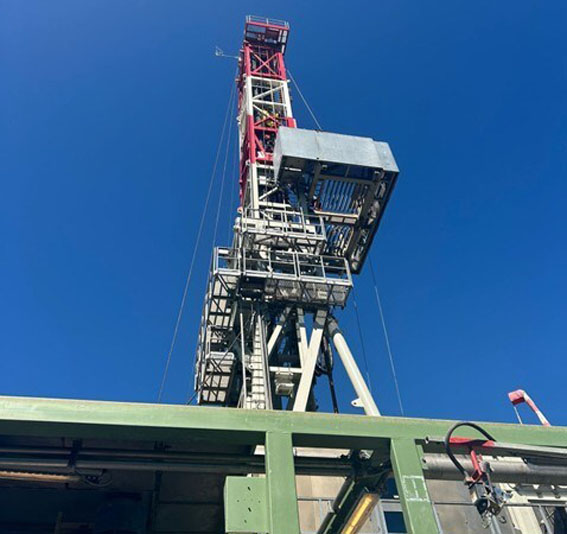MCF Energy has announced an operational update for the Kinsau-1A well in Lech, Germany.

Kinsau 1A Drill Site (CNW Group/MCF Energy Ltd.)
The RED Drilling Rig 202 has completed rigging up at the Kinsau-1A drill site and testing the safety equipment. Drilling operations commenced on August 8th with the entry into the original 13 3/8-inch steel surface casing installed when Mobil drilled the Kinsau-1 discovery well in 1983. Despite testing at over 24 million cubic feet (MMCF) of gas and condensate per day, natural gas prices in 1983 did not warrant development, so Mobil shut in the Kinsau-1 well later abandoned it. The concrete abandonment plugs and kill mud have now been drilled out to the base of the steel casing to a depth of 1002 meters. No anomalies were found, and the cement plugs were hard and intact. The casing string will be pressure tested and inspected to confirm integrity before any deeper drilling is done. This casing protects the shallow ground water resources in this area. An offset water monitoring well has been drilled and will be monitored to confirm there is no impact to these resources.
At this point the well will drill ahead with a diamond drill bit to the target, the Jurassic Purbeck carbonate interval that tested gas and condensate at high rates in Mobil's original Kinsau-1 well. The deeper Malm carbonate interval was also found to be hydrocarbon bearing in the Kinsau wells drilled by Mobil; it is anticipated that this interval will be penetrated and evaluated but not tested in the Kinsau-1A well. During drilling the drilling mud will be continuously monitored by a logging unit for lithology and gas content.
The drilling program estimates that the Kinsau-1A well will a reach total depth of 3400 meters in approximately thirty days. At this point remote sensing logs will be run in the open hole to determine the geologic formation tops and hydrocarbon saturations. A production string of 7-inch steel casing will be run and cemented to safely isolate the hydrocarbon zones for testing. The open hole log data will be used to refine the testing program that will be performed with a workover rig. Well results will likely be known later in the third quarter of 2025. Discussions are occurring with a local pipeline company for future pipeline construction and offtake.
Genexco GmbH, a 100% subsidiary of MCF Energy Ltd., is a 20% partner in the Kinsau Gas Project. The regional Mining Authority in Bavaria has inspected and approved the drill site. The drilling of this well will follow all applicable environmental regulations and safety procedures.
The target for the Kinsau-1A well was determined using the Mobil well information and a 3D seismic survey acquired by Mobil in 1985. The seismic data was reprocessed and analyzed using Paradise Machine Learning and AI software which determined the optimum reservoir location. This analysis suggests that the Jurassic Purbeck reservoir will be thicker at the Kinsau-1A target than in the original Kinsau-1 well.
The Paradise analysis has confirmed additional significant potential in the 100 square kilometer block on trend and directly offsetting the Kinsau 1A well to the east. A successful test of the Kinsau-1A well would validate the Paradise analysis and strongly support the presence of these additional resources. MCF holds a 100% interest in the exploration licence in this adjacent licence area.
History
The Kinsau-1A drilling project is a re-entry and redrill of the Kinsau-1 discovery well, originally drilled in 1983 by Mobil, which produced impressive test results of over 24 MMCF of gas and condensate per day. Mobil drilled the Kinsau-1 well to a depth of 3940 meters, where it encountered basement rocks. Gas and condensate indications were found within the Jurassic Purbeck Formation at 3,179 meters. The well was completed by stimulating it with acid and tested over a 22.5-metre perforated interval. The entire well test took 3.5 months to complete. A variable rate test was conducted on July 28 to 29, 1983 with three flowing rates reported: 7,712 thousand cubic feet per day (MCFD) at 2,973 psi, 14,832 MCFD at 2,785 psi, and 24,706 MCFD at 1871 psi. The total test pressure dropped from 4,110 psi to 4,090 psi (283.4 to 282 bar). The test resulted in a recovery of 45.9 MMCF of gas and 1,510 barrels of condensate. These test results are not necessarily indicative of long-term performance or of ultimate recovery.
James Hill CEO of MCF Energy said:
"I am very excited to see this well being drilled. With Germany importing much of the natural gas needed for homes and industry, a successful well should confirm that Germany has energy resources within its own borders that can provide energy security and the environmentally desirable natural gas resources the country needs."
KeyFacts Energy: MCF Energy Germany country profile
 KEYFACT Energy
KEYFACT Energy